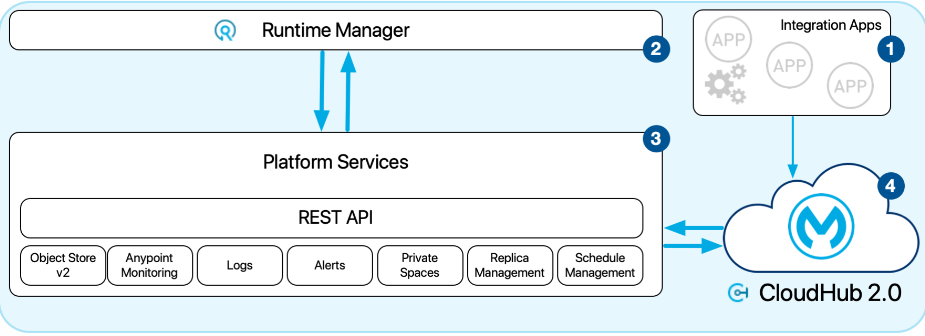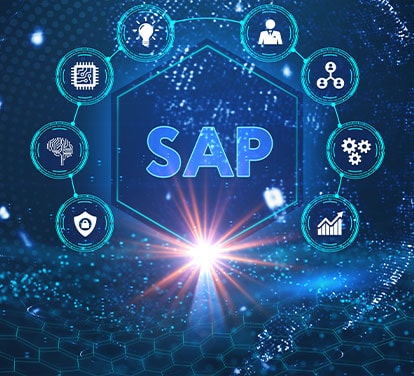MuleSoft CloudHub 2.0 is more than just an upgrade; with enhanced features, scalability, and a user-friendly interface, it empowers organizations to effortlessly connect applications, data, and devices across the cloud and on-premises.
In today's fast-paced business landscape, the efficient exchange of data and seamless connection of systems are not just advantages; they're essential for staying competitive. Businesses can't afford to have their data, applications, and systems operate in isolation. The key to unlocking their full potential lies in the seamless integration of these disparate elements. This is where Enterprise Integration Services come into play, offering a strategic framework for organizations to harmonize their digital ecosystem.
As a leading player in the field of enterprise integration, MuleSoft has consistently pushed the boundaries of what's possible in connecting, streamlining, and enhancing operations. Now, with the release of MuleSoft CloudHub 2.0, they've raised the bar once again.
This blog delves into the intricacies of the newly introduced MuleSoft CloudHub 2.0 and provides an in-depth analysis of its features and capabilities.
What is MuleSoft CloudHub?
MuleSoft, a Salesforce subsidiary, is a market-leading integration platform that enables businesses to link devices, data, and applications through APIs (Application Programming Interfaces).
CloudHub is one of MuleSoft's premier products. It is a multi-tenant, fully managed integration Platform as a Service (iPaaS) that offers a safe and scalable environment for integration and API administration.
After CloudHub 1.0, now Mulesoft has introduced CloudHub 2.0, which is a fully managed, containerized iPaaS that allows deploy APIs and integrations as lightweight containers in the cloud.
Enhancements in MuleSoft CloudHub 2.0 for Advanced Enterprise Integration Services
In MuleSoft CloudHub 2.0, a host of advanced features have been introduced to empower organizations in their quest for seamless and efficient enterprise integration. These enhancements not only build upon the robust foundation of its predecessor but also pave the way for even more dynamic and scalable enterprise integration services. Let's delve into some of the standout features:
- Scalable Web Applications: Effortlessly expand web apps for increased demand.
- Multiple Trust Stores: Secure mutual TLS communication with support for client certificates.
- Multiple Custom Endpoints: Flexibility to tailor integrations with multiple custom endpoints.
- Load Balancer Logs: Gain visibility into integration traffic with detailed load balancer logs.
- VPC and VPN (Private Space): Connect securely to VPC and VPN for private communication (Private Space only).
- Outbound Firewall Rules: Enhance data security with outbound firewall rules (Private Space only).
- Static IP Addresses: Ensure consistent communication with static IP addresses (Private Space only).
- Mule Clustering: Improve reliability and fault tolerance with Mule clustering.
These enhancements empower organizations to optimize integration for the modern digital landscape.
Benefits of MuleSoft cloud Hub 2.0
MuleSoft CloudHub 2.0 introduces a wealth of benefits for organizations seeking cutting-edge integration solutions:
- Enables runtime deployments across 12 global regions.
- Facilitates elastic transaction volume support through dynamic scaling of infrastructure and built-in services up or down
- Adopts a standardized, lightweight isolation boundary by running each Mule instance and service as a separate container.
- Employs a forward-thinking design to expedite development and foster innovation.
- Incorporates inherent security measures, safeguarding services and sensitive data through encrypted secrets, firewall limitations, and controlled shell access
How MuleSoft CloudHub 2.0 is Different from CloudHub 1.0?
- Cloud Hub 2.0 does not support VPC peering or direct connection. Transit gateway attachments are now usable. Anyhow, if a private space with a connected transit gateway is deleted, the transit gateway is still there and can be reattached to another private space.
- Applications must be redeployed to a new shared space or private space in a different region to be moved between them. Once deployed, the software cannot be moved to a new area.
- Port 8081 is used for HTTP and HTTPS traffic.
Architecture of CloudHub 2.0
CloudHub 2.0 is very fast. Everything needs to be published in Anypoint Exchange. It offers a multitude of options for defining numerous VPNs, enabling robust application isolation, and the freedom to establish customized rules.

Migration from CloudHub 1.0 to CloudHub 2.0: Key Points to Consider
- Cloud hub 2.0 supports only 4.3.0 and above runtime only.
- Mule Maven plugin must be greater than 3.7.1 or above. If you see the CloudHub 1.0 apps with lesser versions, you need to update them.
- There are no tools or automatic migration from CloudHub 1.0 to Cloudhub2.0.
- If your Cloudhub1.0 applications use persistent queues, they need to replace them with Anypoint MQ or any other broker MQs that support this feature.
- Custom Notifications are no longer supported.
EndNote: Move Ahead with Jade
MuleSoft CloudHub 2.0 redefines enterprise integration, allowing global deployments, elastic scalability, and a future-ready design. It's the future of seamless connectivity.
Partnering with Jade Global, a MuleSoft Integration Specialist, ensures a successful digital transformation journey. They offer a full spectrum of enterprise integration services tailored to specific industries like Hi-tech, Retail/CPG, and Life Sciences. Backed by certified experts, Jade Global connects every facet of your business for accelerated outcomes and integrated experiences.
To harness the power of enterprise integration with MuleSoft, connect with Jade experts.







